Abstract
Choosing a proactive approach, when regarding effective managerial communication, grants teachers the opportunity of learning good practices and behaviors through inter-assistance. In this context, the performance of the assistant teacher is well highlighted, through implementing and sharing examples of good habits at preschool level pupils. Our study aimed at showcasing different perspectives to the collective opinion within the inter-assistance programme about learning activities in kindergarten. The study was attended by 24 teachers in the second semester of the 2020-2021 school year. The structure of the study-group was analyzed from several perspectives: their didactic functionality, degrees and qualifications and experience within the field. Research methods used were the following: analysis and drafting of school documents, systematic observation, questionnaire-based survey. Said questionnaire covered multiple items, among which: the viability of carrying out the inter-assistance programme; the systematization, management and evaluation of the proposed learning activities; documenting of used teaching strategies; as well as progress tracking and improved aspects. By observing and interpreting results, we were able to conclude that the outcome of the inter-assistance teaching programme had a positive impact: more than 90% of teachers involved state to have positively amended their approach when it comes to assessing and evaluating pedagogical activities. As proven by the current study, one can attest that the inter-assistance programme offers the opportunity to collaborate and to showcase and interactive and proactive approach by personalia, with collective implication in an interchange of good practices which can facilitate problem solving and better optimize the management of learning activities.
Keywords: Collective reflection, inter-assistance program, improvement, inter-change of good practices
Introduction
Good cooperation and collaborative decision making are detrimental in transitioning from a traditional approach to a modern, more liberal one, in our way of establishing good relations and logistics withing an enterprise. Ciolan (2008) has identified and stated the educational enterprise’s roles, both institutionally and logistically, as follows:.
Successful implementing of managerial relations, at all levels of management in kindergarten, requires fruitful, harmonious collaboration between those involved. This kind of an approach would regard “active participation and accountability, on the one hand, as well as strategic thinking and control, on the other hand” (Pânișoară & Manolescu (coord.), 2019, p. 45).
The reports between the management levels in kindergarten imply permanent exchange of messages, ideas, initiatives, as manifested by those involved, each in their specific bit. However, in order to analyze particular ways of inter-institutional communication at kindergarten level, it is necessary that we approach communication “from a managerial perspective, focusing on how it influences organizational behavior” (Răduț-Taciu et al., 2015, p. 395). With this theory being set on several different values that aim to improve and optimize functionality within the institution: collaborative, democratic approach; proactive and interactive attitudes, communication, self-reflection, flexibility, can we state that the main feature of the educational process lies in its complexity, variability, as well as diversity that exists between objective and subjective partakers: the students, each with their individual set characteristics and values, different learning potential, personalities and skills, as well as teachers, which opt for different strategies and pedagogical techniques, depending on their educational and experiential background. (Chiş & Grec, 2016, pp. 161-166).
A collaborative, child-centered, democratic approach in preschool grants teachers the opportunity to continuously learn and exchange good practices and behaviors through inter-assistance. The diversity and dynamics of all social mechanisms reflected on an individual level have direct repercussions upon education. Good social dynamics and collective integration are reflected upon as early as the age of preschool, and they can directly affect the educational process for children (Răduț-Taciu et al., 2015). In this context, the performance of the assistant teacher is very well highlighted, as they implement and share examples of efficient techniques through inter-assistance, whilst showcasing and continuously developing new “professional competences and authentic didactic experience” (Bocoș et al., 2009, p. 145). This can be a good opportunity for preschool teachers to illustrate that “teaching and daily learning practices are the main focus and everyone involved is responsible for the children’s school performance” (Hattie, 2014, p. 305). Participation and integration in a social group has serious influences that reflect upon each member, and thus, through their dynamics and interaction, they stimulate each other socially and emotionally, with each one looking to capitalize their own potential (Păuș, 2006).
Regardless of the level of kindergarten management in which the preschool teacher is involved, the impact this can have manifests, to an overwhelming extent, in group activities with preschoolers. Optimizing the management of learning activities implies that educational practice shall be followed by critical reflection, “the practice of personal mastery (…) being achieved through individual reflection” (Senge, 2016, p. 87).
Achievement of a quality management in learning activities implies personal examination and analysis of didactic approach, introspection, evaluation/self-evaluation by reporting to particular competences of this vocation, professional standards, to quality assurance conditions and to proposed objectives. I. Cerghit (as cited in Bocoș, 2013, p. 161) stated that “without reflection, there is no knowledge, elaboration, creation”. Thus, the preschool teacher who can put out a reflective, flexible mindset, should pass his students’ experiences through his own personal judgement, and encourage them to reflect on what they are doing before, during and after the completion of the learning activity. When looking for answers, one needs to search, contemplate, adjust and mend, personally and professionally, in order to grow (2013).
Personal reflection of the kindergarten teachers leads to, and thus, as an effect, to adopting interdependent actions between them, in order to come to a final, common conclusion, claimed by the educational institution (Bocoș, 2013). A study conducted in 2013 in Sweden by Hult et al. (2016) highlights the importance of reflection and evaluation with our close ones (preschool teachers, in this case), with reflection and dialogue being repeatedly emphasized as means of improving the teaching process. The closer the discussions are to the particular practices of each teacher, the more valuable the professional claims become. This ensures better quality within the educational institution, so long as the change is being implemented in an ascending, and not descending way, through internal and not external evaluation.
Starting from this point, we can see that there is a need for kindergartens to rethink professional development, continuous forming, in order to meet current needs. Specialized literature brings forward the importance of decision making in the institution, Hattie (2014) and identifies one more aspect that directly influences school performance, this being of teachers that strive for finding optimal solutions in didactical management. Quality inter-human relationships determines the results, with staff development involving, first of all, good cooperation, sharing experiences, in order for the institution to have one unique trajectory, as well as a singular vision shared by all those involved (Senge, 2016).
According to Desimone (acording to Ceobanu et al., 2020), one of the partaking elements of an effective training programme is, that is the participation, in the same training programme, simultaneously, of several teachers who teach the same specialization. Inter-assistance offers a new perspective, taking into account the fact that teachers can learn from each other, with advice and feedback being easily accessible to everyone (Keen & Tirca, 2000). The inter-assistance programme facilitates the development of essential competences in the field that the assisted teachers specialize in, but do not neglect certain skills that may require improvement or more practice, as this process grants for a thorough analysis and optimization of the management of learning activities. At the same time, inter-assistance allows kindergarten teachers to propose initiatives regarding their own needs, in perfecting their professional set of skills. As identified after sustained personal reflection and external feedback, or after debating and discussing opinions with colleagues, each decision, as taken by those directly involved will be weighed and, if worth, implemented, inside the institution. Still, we must consider that, when working in groups, communication between the members of the groups is more frequent and more diverse, as opposed to activities in which the whole class is involved, and often children end up being rather passive. Pupils are significantly more active and spontaneous when working in small gatherings, they interact with colleagues, encourage each other to solve tasks or carry out collective work, they train their team spirit and help one another, thereby experiencing genuine human interaction and approval, whilst having their personal social needs of compassion and appreciation satisfied (Chiș et al., 2019).
Problem Statement
The constant monitorization of the activities carried out with preschoolers (following the assistance of experts and specialized inspections) and the opinions and statements of pedagogy specialists have brought attention to the need for collective implication and that of carrying out training/inter-assistance programme. By capitalizing already existing multimedia means and resources, teachers carried out said activities in their classrooms with online broadcasting on the kindergarten’s live platform, with the transmission being available for all personalia to watch in real time. Proposed activities involved all teachers in the institution (including the principal and the counsellor teacher) and addressed all categories of learning activities, as according to the Curriculum for early education.
Research Questions
The current study emerged from the following research questions:
What impact does the inter-assistance programme have on teachers, in terms of skills for projecting, organizing and evaluating learning activities with preschoolers?
What is the impact of showcasing good practice examples on strategies related to learning activities management?
To what extent has the process of collective reflection contributed to the improvement of learning activities with preschoolers?
Purpose of the Study
The study aimed at influencing the collective reflection found in the inter-assistance program on learning activities in kindergarten.
Research Methods
The study was attended by 24 teachers during the second semester of the 2020/2021 school year. The structure of the group was carefully selected, by taking into consideration several different perspectives: the didactic functionality, the degrees and qualifications of members and experience in the field, as can be seen in Figures 1, 2 and 3:
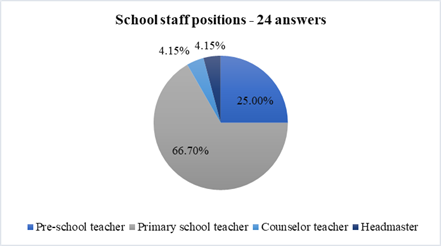
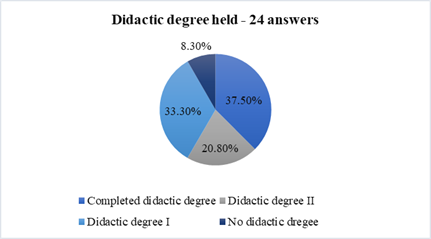
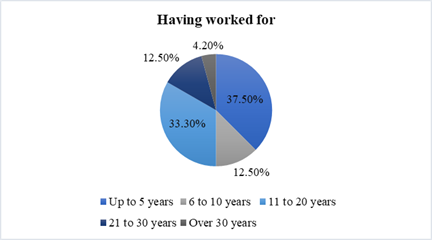
Among research methods used, we name: school documents analysis, systematic observation, questionnaire-based survey. Said questionnaire covered 7 distinct items, namely: the opportunity of carrying-out the inter-assistance programme; the projecting, organizing and evaluation of learning activities; pedagogical strategies implied; improved aspects; optimal frequency of conducting an inter-assistance programme. The items aimed within the questionnaire were correlated with the research questions: items 2, 3 and 4 with the first question, item 5 with the second question, and items 1, 6 and 7 with the third research question.
Findings
Regarding the viability of carrying-out the inter-assistance-programme, 63% (15) of the teachers viewed it as being a fruitful opportunity to a great extent, 33,3% (8) viewed it so to a noticeable extent, while 4,2% (1) abstained, as shown in Figure 4:
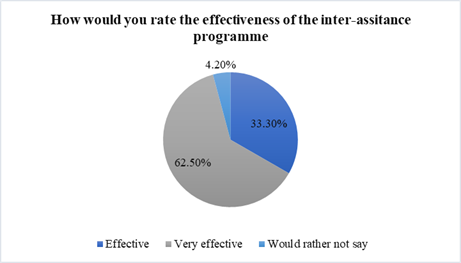
By interpreting the answers received, we see that only one teacher did not express their opinion on the viability of the inter-assistance programme; same teacher later considering that they did, after all, improve their abilities with planning, organizing and implemented more effective management strategies. Regarding the improvement of projecting and designing new learning activities, 37,5% (9) teachers answered that the programme was proven useful to a very large extent, 54,2% (13) to a noticeable extent, and 8,3% (2) to a small extent, as shown in Figure 5:
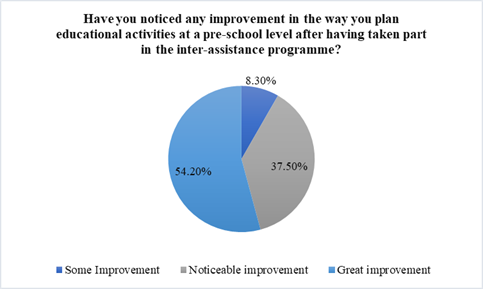
The designing and planning skills have been improved to a very large extent for teachers with no teaching degree and beginners (10), whilst also being largely improved for teachers with teaching degree I and teaching degree II (12). Only two teachers (one without a teaching degree and one with a teaching degree I) considered that they improved their design skills only to a small extent.
The third question aimed at improving the way learning activities are implemented. For 54,2% (13) of the teachers, the improvement of the organization of learning activities was largely achieved, for 41,7% (10) to a noticeable extent, and 4,1% (1) of them chose to abstain, according to Figure 6:
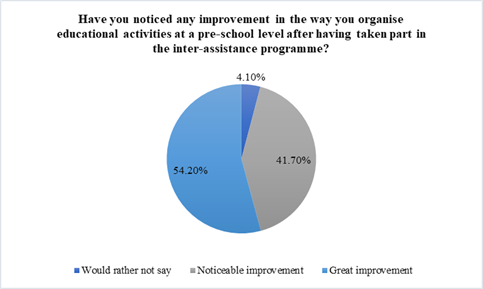
9 beginner teachers and two teachers with no a teaching degree state to have improved their skills in organizing learning activities with preschoolers to a very large extent, 12 teachers with teaching degree I and II improved their skills noticeably, while one single teacher with teaching degree II did not comment.
Regarding the improvement of learning activity evaluation with preschoolers, 54,2% (13) of the respondents answered that to a very large extent, 37,5% (9) to a large extent, 4% (1) to a small extent and 4% (1) did not comment, according to Figure 7:
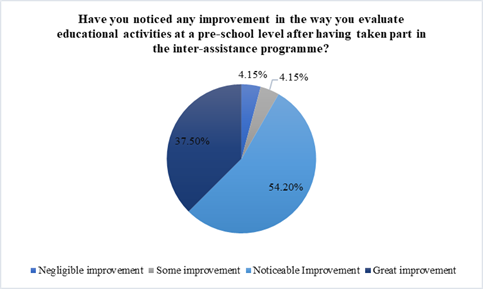
The competencies of preschool learning activities evaluation have been largely improved for beginner teachers (9) and teachers without a teaching degree (2), but also for teachers with teaching degree I and II (11). One teacher with teaching degree I improved their skills for evaluating learning activities with preschoolers to a small extent, and another chose not to comment.
The next question vises the adopting and efficient implementing of management strategies within the teaching activity in the classroom, 50% (12) of the respondents answered that the programme has facilitated this to a very large extent, 45,8% (11) to a noticeable extent, and 4,2% (1) to a small extent, according to Figure 8:
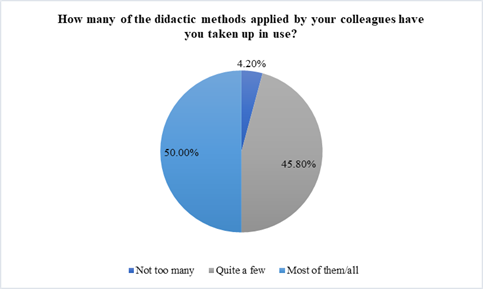
Adopting these teaching strategies was achieved to a large extent by the beginner teachers (9) and teachers with no teaching degree (2), but also by those with teaching degree I and II (12). One single teacher with teaching degree I and over 30 years of seniority in education has adopted strategies from colleagues only to a small extent.
Regarding the particular aspects that were improved within the classroom, as following the completion of the inter-assistance programme, we identified the following, according to Figure 9:
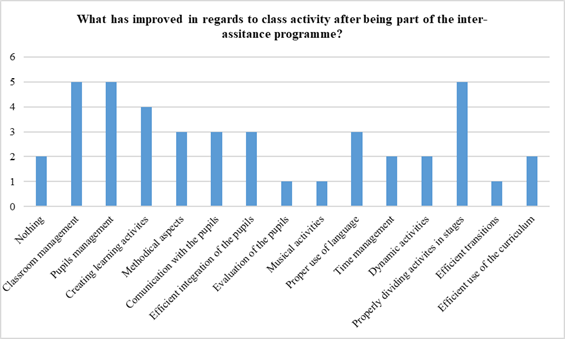
- nothing (2)
- pupils management (5);
- class management (5);
- creating learning activities (4);
- methodical aspects (3);
- proper use of language (3);
- efficient integration of the pupils (3);
- evaluation of the pupils (1);
- musical activities (1);
- teacher’s language (3);
- time management (2);
- dynamic activities (2);
- properly dividing activities in stages (5);
- efficient transitions (1);
- efficient use of the curriculum (2);
It can be concluded that beginner teachers present the most numerous improved aspect (in designing and organizing learning activities, pupils management, classroom space management, student-teacher communication, methodical aspects, properly dividing activities in stages, evaluation of pupils, a more efficient use of curricular resources, while one of those with no teaching degree has improved their skills with managing classroom space and another did not identify any improved aspects.
As about teachers who have seniority in education - those teachers with teaching degree I have identified more improved aspects (properly dividing activities in stages, implementing more dynamic activities, more efficient transitions, student-teacher communication, better time management, organization of the classroom space, efficient use of the curriculum and implementing musical activities) than those with teaching degree II (which state to have improved their skills of organizing classroom space, communication and effective adaptation of digital tools). One teacher with teaching degree I and with over 30 years seniority in education did not identify any improved aspects.
Teachers that have participated in the inter-assistance programme claim that the optimal frequency of it being ran would be the following: annually - 54% (13), semi-annually (every semester) – 42% (10), every 2 years – 4% (1), as according to Figure 10:
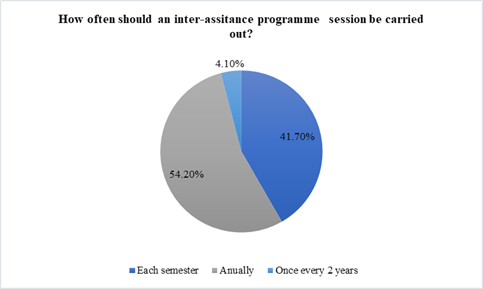
Conclusion
Upon analyzing the results obtained from the application of the questionnaire, and referring to the first research question, we may conclude that the impact of the inter-assistance programme was positive: with 92% of teachers participating in the inter-assistance programme having improved their projecting and designing skills, 96% of staff their organizing skills, and 92% those of evaluating teaching activities. Among the teachers who have noticed improvement to a small extent their designing skills, organizing and evaluating of teaching activities, or chose not to comment, there are both beginners and people with long experience in education. This result might be cause to a lack of self-reflection, as showcased by the teachers.
The second research question focused upon the impact of collaboration in inter-changing experiences, efficient habits and good practiced and concluded with the following statistics: 96% of teachers adopted new strategies meant to facilitate better management of teaching activities with preschoolers. The fact that only one teacher has stated that they have adopted, only to a small degree, techniques from their colleagues can be interpreted as a reluctance to change old habits and practices and lack of flexibility.
The third research question highlights the fact that partaking in the inter-assistance programme was, after all, a process of collective reflection which, through the multitude of aspects improved in learning activities with preschoolers (in the case of 92% of staff teachers) has had a positive impact on the majority of teachers. Again, 8% have not seized any improvement whatsoever. Yet, at the same time, the impact of inter-assistance programme also emerges from the answers to the questions 1 and 7, where 96% consider it a fruitful opportunity to be carried out, with a resumption, while 4% chose not to express themselves about this opportunity. One possible reasoning behind the teacher who did not comment on the inter-assistance programme could be the need for a longer, more thorough analysis upon its impact, or a more effective group monitorization and it not being based solely on statements within the questionnaire.
We can see, from the data provided by the participants in the inter-assistance programme that efficiency has also been facilitated by these following aspects: 75% of participant teachers have higher education, over 50% of teachers have grades II and I and over 10 years of experience (with in-field expertise), programme participation of all management levels (administration, curriculum comittee, classroom teacher) as well as the counselor teacher.
If we look at the hypothesis proposed at the beginning of this written paper, we can now affirm that the inter-assistance programme sustains and encourages the implementing of a proactive and interactive approach, personal and collective reflection, collective initiative and partaking through an interchange of good practice and habits, meant to facilitate the management of learning activities.
References
Bocoș, M., Catalano, H., Avram, I., & Someșan, E. (2009). Pedagogy of preschool education. Teaching tools. Cluj University Press Publishing House
Bocoș, M.-D. (2013). Interactive Training. Polirom Publishing House.
Ceobanu, C., Cucoș, C., Istrate, O., & Pânișoară, I.-O (2020). Digital education. Polirom Publishing House
Chiş, O., & Grec, C. D. (2016). Pedagogical Aspects of Teaching, Learning, Assessing the Reading-Writing Elements for Primary School, 4th Conference on Education (2016). Reflection, Development (ERD) European Proceedings of Social and Behavioural Sciences (pp. 161-166). DOI:
Chiș, O., Magdaș, I., Dulamă, M. E., & Moldován, K. R. (2019). Learning through cooperation and project method in pre-school education in Romania. 6th ERD Conference, European Proceedings of Social and Behavioural Sciences, LXIII, 565-572. DOI:
Ciolan, L. (2008). Integrated learning – foundation for a transdisciplinary curriculum. Iași: Polirom Publishing House
Hattie. J. (2014). Visible learning – a guide for teachers (C. Dumitru, trans.). TREI Publishing House (the original paper published in 2012)
Hult, A., Lundström, U., & Edström, C. (2016). Balancing managerial and professional demands: school principals as evaluation brokers. Education Inquiry, 7, 283–304. DOI:
Keen, E., & Tirca, A. (2000). Democratising your school: a practical guide for headteachers. RADICAL Publishing House. https://archive.org/details/DemocratisingYourSchool/page/n7/mode/2up
Pânișoară, I.-O., & Manolescu, M. (coord.) (2019). Pedagogy of primary and preschool education. I. Polirom Publishing House.
Păuș, V. A. (2006). Communication and human resources. Polirom Publishing House
Răduț-Taciu, R., Bocoș, M., & Chiș, O. (2015). Educational management treaty for primary and preschool education. Paralela 45 Publishing House.
Senge, P. (2016). Learning schools.The fith discipline applied in education. TREI Publishing House.
Copyright information

This work is licensed under a Creative Commons Attribution-NonCommercial-NoDerivatives 4.0 International License.
About this article
Publication Date
23 March 2022
Article Doi
eBook ISBN
978-1-80296-955-9
Publisher
European Publisher
Volume
2
Print ISBN (optional)
-
Edition Number
1st Edition
Pages
1-803
Subjects
Education, Early Childhood Education, Digital Education, Development, Covid-19
Cite this article as:
Truța, L., & Chiș, O. (2022). Collectiv Reflection-Perspective Of The Management Of Teaching Activities In Kindergarten. In I. Albulescu, & C. Stan (Eds.), Education, Reflection, Development - ERD 2021, vol 2. European Proceedings of Educational Sciences (pp. 564-575). European Publisher. https://doi.org/10.15405/epes.22032.57

